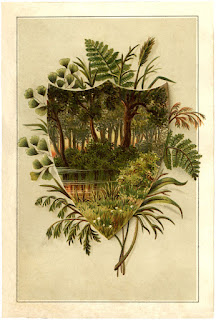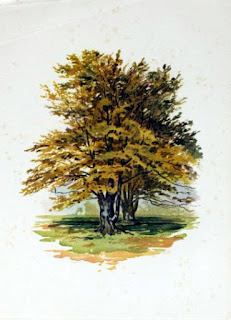It's not uncommon for the work of one genealogist to be handed over to another. Recently a report, granted compiled in 2003, was handed over to me. It was compiled by a "certified" genealogist from a company that was lodged in Salt Lake City. (I will not comment on if it is still there.) The presentation of the research was rather professional for 2003, a booklet like the kind you can get from a photocopy company with plastic claw binding, nice logo and official looking. The report kept noting "sessions" as in "previous research sessions." Never the less, any information previously handed over to the client and repeated in this one should have shown documentation.
The client had paid for more information on their Irish Catholic ancestor who had come to the US about 20 years prior to the Famine and with an expertise. The report went forward with documents of his children BUT THAT WAS NOT THE PROBLEM. The problem was a family mystery. He had gone to Hawaii and disappeared. There was no further communication from him other than a letter from him stating that he had made it, or so the story went. I asked to see the letter and read it aloud to the client. It was clear that there had been an estrangement as he says he has not heard from anyone in a long time as if he's been cut off, he suggests he will return if that's what's best wanted. In a long PS he suggests maybe his wife and family might want to move to Hawaii.
The date of the letter cannot suggest when he left or even how long it took to be recieved.
My research showed that it could take six months or more each way to get a letter from New York to San Francisco. A year or more could have gone by.
Of course I cannot know how many times this pro communicated with the client and what was said but I started to feel angry that so much time had been wasted.
There were photocopies of books read seeking some mention of mystery man's, name and in the business he was supposed to partake in. Since he was not supposed to be an owner, I saw this as a debatable pursuit.
Had he died? When? Did he forget his wife and children and marry another women? Had he gone and failed, perhaps because Protestant missionaries were busy in Hawaii and he was Catholic and was not allowed into the ship captain, missionary, sugar business cabal? Maybe he died of disease or fell off another boat. Or he had to find the work of a common laborer - with Chinese - and had not a cent to get back home. Then there was the mail which could take months - had he sent another letter that was never recieved? Had she replied?
When had he died and where?
I'm reminded of a person I knew years before who was illegitimate. Her mother told her to tell people her daddy had been killed in the war circa 1948. I wondered if the whole Hawaii thing had been a deal circa 1848 between a couple who couldn't divorce!
This report I was reviewing was a culmination of various "sessions" over many pre database years. It was clear to me this genealogist was hinting at more books he could read but had failed to find the mystery man on records. This can happen despite extreme efforts. But where was evidence that a proper search had been made?
And if someone wanted to disappear mid 1800s it was a lot easier than today. The long sail trips around the Cape Horn - the spirit of adventure - he could've written a letter and had a shipmate friend mail it from Hawaii.
But one fact hit me. The widowed wife of an immigrant was able to send a son to college and law school. How was that afforded? How did a woman with children who never remarried in the pre Civil War days in a town in a smallish North Eastern town keep going? Had one or both of them come to America from Ireland with a fortune?
Further she bought land in her own name about 1846. This any feminist genealogist will tell you is a clue. A couple years before the date on the letter. Did she come with money of her own?
And one had to have land there and then in New York to become a citizen.
Immediately I suspected she knew her husband was gone for good though the letter that supposedly stated he had "made it" to Hawaii was 1848. I reread the letter.
Was it possible that her husband never came back to her but did prosper to send money for years? Had there been a quiet divorce? The potential for court records and land purchase had been unexplored.
The report repeated the family story, perhaps a mythology. There is no documentation for the story.
There is no name of a ship. No departure date. No manifest. No citizenship. No church records.
The thing that most struck me is that if it was not at the Latter Day Saint's Family History library in Salt Lake, it was as if that resource did not exist.
Therefore, after an hour of research with five pages of my notes in hand, I asked the client to give me all previous research sessions.
A much fatter report from 2002 began with evidence of trying the Hawaii State Archives and University of Hawaii to report on their collections and some of these collections held potential but there was no evidence that any of them had actually been examined by anyone, stating he'd have to go to Hawaii to look. No - that's when you're supposed to actually contact an archivist there for guidance or pay them! Same thing about Irish archives.
Irish genealogy can be problematic due to a repetition of common names. I've had to tell a client there were 16 men with the same name coming over the same year - there was more that could be done - but he didn't want me to look for naturalization that would give me the town because he didn't want to pay more.
Years into this professional's research there was a note of a naturalization in New York but no copy of it. Perhaps it would state where he was born in Ireland. Yet in 2003 the pro was still ? On the place and date of birth.
I was researching at and through LDS Family History Centers at least as far back to 2000. Why had he not looked at/ for the naturalization? Indexes are meant to help us get to originals.
There is no evidence of a search for wills. Or confirmation of the land purchase of land.
I started to feel angry.
Imagine when I got to the middle of a pile of reports and noticed a different genealogist working for the same company had started this same research problem in the 1980s and had actually done, despite more obstacles, more and better research. Still, no documentation.
*****
Believing undocumented family stories is a genealogy myopia.
*****
It's ethical for a pro genealogist to say they gave hit into a brick wall and can go no further with what's available.
It's another to not look at appropriate available records just because they are not at an LDS or other research library.
*****
My recommendations are for the descendant who inherited these reports to go forward with Hawaii State Archives, the Catholic diocese of Honolulu, and the Catholic diocese in the US, as well as land purchase and naturalization for the woman who reportedly never knew what happened to her husband. If court records are not in existence, II would still approach historical societies and reach out to libraries local to the questions
It's good to know history and read books about Hawaii developing but not realistic to find mention of a worker who was not an owner or executive in these authored and edited books. However, details about the island. Catholic Missions, and Sugar might enrich the story, such as telling what the island was like when the ancestor wrote his letter.
I would learn more about how someone might get to Hawaii from the East Coast. Based on Catholic and Irish heritage it's my notion the port of Boston would've been used.
C 2021



























